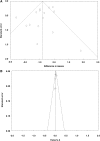Low-calorie sweeteners and body weight and composition: a meta-analysis of randomized controlled trials and prospective cohort studies
- PMID: 24944060
- PMCID: PMC4135487
- DOI: 10.3945/ajcn.113.082826
Low-calorie sweeteners and body weight and composition: a meta-analysis of randomized controlled trials and prospective cohort studies
Abstract
Background: Replacement of caloric sweeteners with lower- or no-calorie alternatives may facilitate weight loss or weight maintenance by helping to reduce energy intake; however, past research examining low-calorie sweeteners (LCSs) and body weight has produced mixed results.
Objective: The objective was to systematically review and quantitatively evaluate randomized controlled trials (RCTs) and prospective cohort studies, separately, that examined the relation between LCSs and body weight and composition.
Design: A systematic literature search identified 15 RCTs and 9 prospective cohort studies that examined LCSs from foods or beverages or LCSs consumed as tabletop sweeteners. Meta-analyses generated weighted mean differences in body weight and composition values between the LCS and control groups among RCTs and weighted mean correlations for LCS intake and these parameters among prospective cohort studies.
Results: In RCTs, LCSs modestly but significantly reduced all outcomes examined, including body weight (-0.80 kg; 95% CI: -1.17, -0.43), body mass index [BMI (in kg/m²): -0.24; 95% CI: -0.41, -0.07], fat mass (-1.10 kg; 95% CI: -1.77, -0.44), and waist circumference (-0.83 cm; 95% CI: -1.29, -0.37). Among prospective cohort studies, LCS intake was not associated with body weight or fat mass, but was significantly associated with slightly higher BMI (0.03; 95% CI: 0.01, 0.06).
Conclusions: The current meta-analysis provides a rigorous evaluation of the scientific evidence on LCSs and body weight and composition. Findings from observational studies showed no association between LCS intake and body weight or fat mass and a small positive association with BMI; however, data from RCTs, which provide the highest quality of evidence for examining the potentially causal effects of LCS intake, indicate that substituting LCS options for their regular-calorie versions results in a modest weight loss and may be a useful dietary tool to improve compliance with weight loss or weight maintenance plans.
© 2014 American Society for Nutrition.
Figures





Comment in
-
What do you say when your patients ask whether low-calorie sweeteners help with weight management?Am J Clin Nutr. 2014 Sep;100(3):739-40. doi: 10.3945/ajcn.114.094466. Epub 2014 Jul 30. Am J Clin Nutr. 2014. PMID: 25080461 Free PMC article. No abstract available.
-
Question about a recent meta-analysis of low-calorie sweeteners and body weight.Am J Clin Nutr. 2014 Dec;100(6):1604. doi: 10.3945/ajcn.114.098772. Am J Clin Nutr. 2014. PMID: 25411296 No abstract available.
References
-
- Flegal KM, Carroll MD, Kit BK, Ogden CL. Prevalence of obesity and trends in the distribution of body mass index among US adults, 1999-2010. JAMA 2012;307:491–7. - PubMed
-
- US Department of Health and Human Services. The Surgeon General's call to action to prevent and decrease overweight and obesity. Washington, DC: US Government Printing Office, 2001.
-
- Fitch C, Keim KS. Academy of Nutrition and Dietetics. Position of the Academy of Nutrition and Dietetics: use of nutritive and nonnutritive sweeteners. J Acad Nutr Diet 2012;112:739–58. - PubMed
Publication types
MeSH terms
Substances
LinkOut - more resources
Full Text Sources
Other Literature Sources
Medical
Miscellaneous

